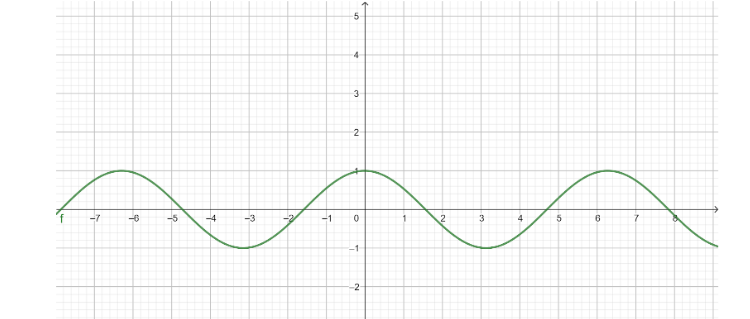Question
Question: How do you use the amplitude and the period to graph \( y = \sin \left( {x + \dfrac{\pi }{2}} \right...
How do you use the amplitude and the period to graph y=sin(x+2π) ?
Solution
Hint : First, using the suitable trigonometric identities, simplify the given equation and try to get a simplest form of the equation so that we can understand it better. Then find the maximum value of the function and the interval after which the graph of the function starts repeating itself as the amplitude of the function is the maximum value of the function and period is the regular interval after which the graph repeats itself.
Complete step-by-step answer :
The given equation is y=sin(x+2π)−−−−−−−−−(1)
This is a trigonometric function. All trigonometric functions are periodic. This means that the function repeats itself after a regular interval on the Cartesian plane.
The trigonometric function sinx has a period of 2π radians. This means that the values of the function sinx repeat after every interval of 2π radians.
This helps in graphing the curve of a trigonometric function. We can graph the function for an interval of 2π radians and then just replicate the function for every such successive interval.
Let us simplify equation 1 by using the identity sin(2π+θ)=cosθ .
Then,
⇒y=sin(x+2π)
⇒y=cosx
So, we get, y=sin(x+2π)=cosx
This means that the graph of equation (1) is the same as the graph of trigonometric function cosx .
Now, we know that the amplitude of cosx is 1 and the period of cosx is 2π . So, the amplitude of the function y=sin(x+2π)=cosx is 1 which means that the maximum value of the function is 1 and the period of the function y=sin(x+2π)=cosx is 2π radians which means that the graph repeats itself after an interval of 2π radians.
So, we get the graph of y=sin(x+2π) as

Note : If we have an equation Asin(kx−ϕ) , then A is the amplitude, k2π is the period and ϕ is the phase shift of the graph.
Here, in this case, A=1 , k=1 and ϕ=−2π .
This means that amplitude of the function is 1 and period is 2π .
